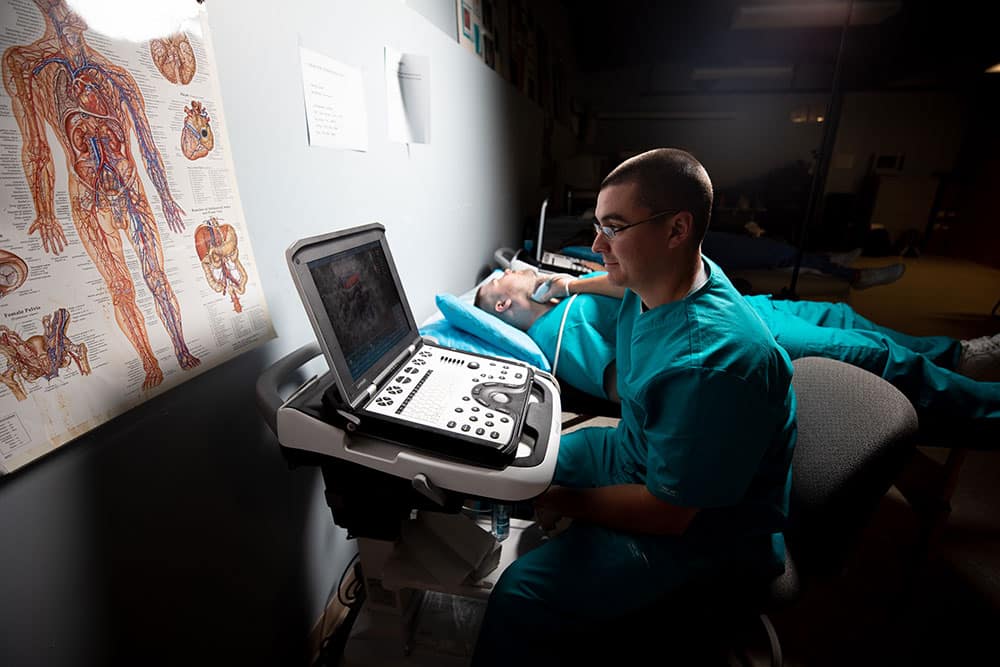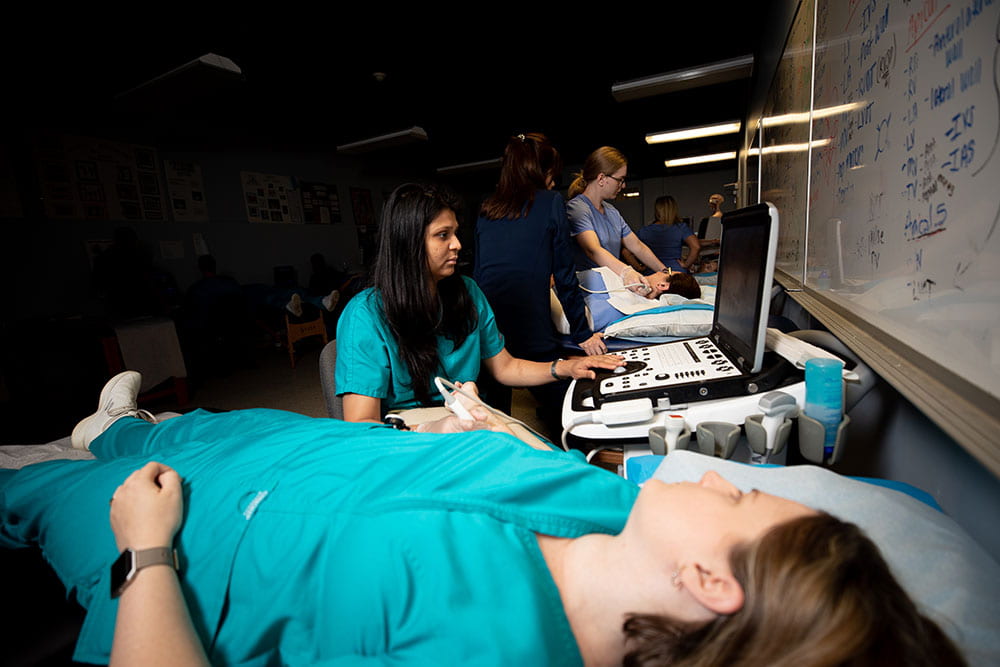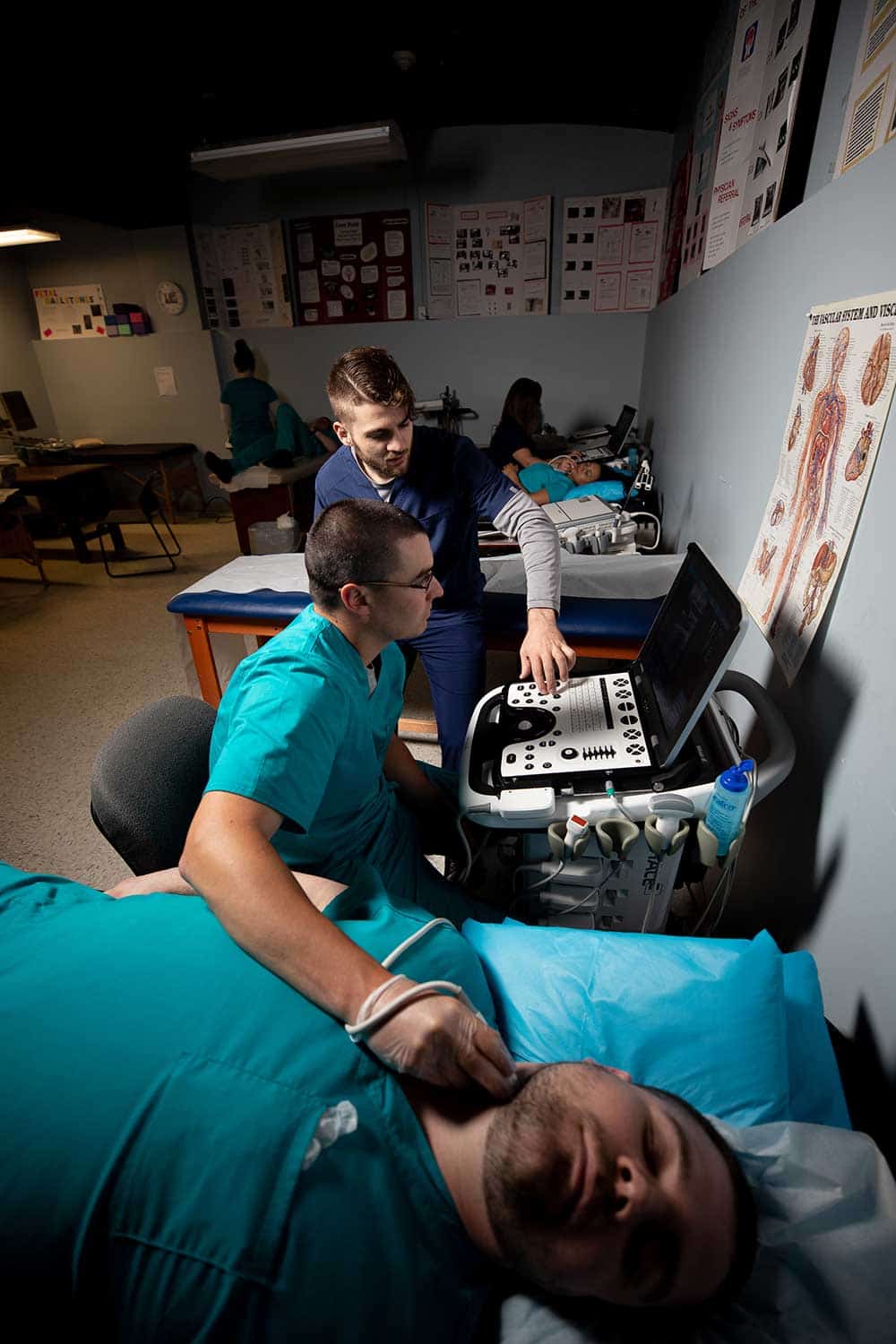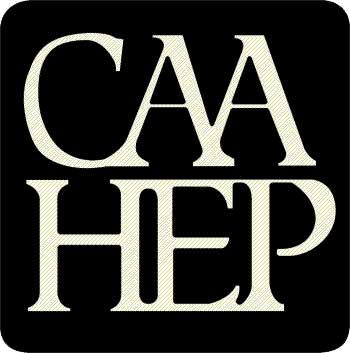Cardiac Ultrasound
At A Glance
Students can specialize and become a Cardiac Ultrasound professional under Lackawanna College’s Ultrasound program.
Learn the latest skills on heart issue detection by studying at Lackawanna’s state-of-the-art facilities.
Graduates will have plenty of career opportunities as the field is expected to grow 14% from 2020 to 2030.
Graduates can earn between $29,910 and $98,070, depending on experience and industry.
Available at the Scranton campus.

Welcome to Cardiac Ultrasound-Associate Degree
If you want to be part of a medical team that helps people detect heart issues then Lackawanna College’s Cardiac Ultrasound program may be the right fit. The College’s Ultrasound associate degree gives you training as a sonographer with the ability to specialize in one of three options – Cardiac Ultrasound, Vascular Ultrasound or Diagnostic Ultrasound.
Your Career Starts Here
Finding a job after graduating from Lackawanna should be relatively easy. Qualified graduates will see the industry grow by 14% over the next 10 years, which will be faster than the average career,
With an associate degree, graduates can work in:
- Hospitals and primary clinics
- Physician offices
- Medical and diagnostic laboratories

More About the Program
Cardiac sonographers use ultrasound technology to examine the heart’s chambers, valves and vessels. Images that are produced by ultrasound are then reviewed by a physician for interpretation and diagnosis of heart abnormalities. Cardiac ultrasound technologists may also choose to specialize in Vascular Ultrasound.
As with the other Ultrasound specialties, the Cardiac Ultrasound program is designed to be completed over a two-year period with day, evening and Saturday courses as well as on- and off-campus clinical hours. The program also includes summer session courses and clinical lab hours.

The Course Work
The two-year program combines classroom instruction with practical clinical externships at regional free-standing and hospital-based ultrasound laboratories. Both career-specific and academic core courses are included. Students successfully completing the program are eligible to sit for the American Registry of Diagnostic Medical Sonographers (ARDMS) examinations.
Some of the classes students typically encounter include:
- Medical Terminology
- Anatomy and Physiology
- Intro to Patient Care
- Intro to Ultrasound Physics
- Cardio Pathophysiology
- Cardio Vascular A&P
- Ultrasound Physics
- Cardio Clinical
- Cardiac Intro to Vascular
- Pharmacology Skills/Therapeutic Techniques
- Medical Ethics
- Skills Lab
- Intro to Peds
Lackawanna College’s cardiac ultrasound program aims to prepare competent entry-level adult cardiac sonographers in the cognitive (knowledge), psychomotor (skills), and affective (behavior) learning domains.
Additional Information
Acceptance into all Lackawanna Colleges ultrasound programs is based on a selective admissions process. Lackawanna selects a maximum of 25 students for the cardiac and vascular ultrasound programs and 20 for the diagnostic medical ultrasound program.
Not all applicants to the ultrasound programs will be accepted. All candidates must follow the standard procedures outlined below and meet program qualifications to be considered for one of the openings each year.
Application to Lackawanna College and a separate application to the ultrasound program
- Priority consideration will be given to applicants prior to the deadline of March 1st. Applications received after the deadline will be considered as space is available
Must meet the college’s minimum requirements
- Applicant must submit proof of high school or GED completion with an official high school transcript or GED equivalent. Lackawanna College will determine the applicant’s current academic ability based on a combination of the following:
SAT or ACT test scores, if applicable
- Recommended SAT scores: 500 Verbal and 500 Math.
- Recommended ACT scores: 20 or higher in each relevant section.
- Most scores are valid for up to 3 years from the test date. College Transfer Credits
- If transferring credits from another college/university, official college transcripts are required. Transfer credits must be at least 3.0 or greater to meet Ultrasound program academic standards. Placement Test
- Applicants without valid SAT/ACT scores and who have not previously earned college credits will be required to take the ACCUPLACER exam for determination of current academic ability.
- Applicants must achieve ‘College Ready’ scores in Reading, Writing, and Math to be considered qualified for one of the Ultrasound Programs.
Completion of a Prerequisite Biology
When applying to the Lackawanna College Sonography Program, a student must prove that he or she is capable of completing this rigorous program with proof of previous success in studying the Sciences. This can be done in one of three ways:
- The student has completed Biology, or Anatomy and Physiology in high school within the past three years with a passing grade of C or better. An official high school transcript must be sent to Lackawanna College as evidence of this.
- The student has completed a three (3) or four (4) credit college-level course eligible for transfer within Lackawanna College in Biology, or Anatomy and Physiology with a passing grade of C or better. An official college transcript must be sent to Lackawanna College as evidence of this.
- If neither of the above scenarios applies, a student must enroll in a college-level Biology, course before applying to a Sonography program. If a student is currently enrolled in this course while in the process of applying to the Sonography program, the student may receive probationary acceptance while completing this course. Evidence by way of an official college transcript must be received confirming completion of the course with a grade of C or better for official entry into Sonography pre-semester. Should the applicant either not complete the course or not receive the requisite grade, he or she will then forfeit the seat in the Sonography program.
Due to the very specific nature of these degree programs, applicants with transfer credits may only transfer credits related to program core courses including the following:
- Anatomy and Physiology I – 4 credits
- Anatomy and Physiology II – 4 credits with lab (if taken within three years)
- College Algebra
- Computer Applications
- College Writing
- Effective Speaking
- Introduction to Psychology
- Medical Ethics (subject to review)
- Medical Terminology (subject to review)
- Transfer students with an Associate Degree in Science may be considered for bypass of the Pre-Ultrasound semester, subject to review.
- All other courses within the curriculum must be completed at Lackawanna College under the Ultrasound program.
Interviews will be scheduled for qualified ultrasound program applicants who submit a fully completed application with all materials by the previously stated deadline:
- The top 25 applicants for Vascular and Cardiac
- The top 20 applicants for DMS
A mandatory informational meeting will be required prior to the start of the selected program.
Qualified students will be notified of the date and time upon selection into the program. The meeting will review the ultrasound department’s policies and expectations. The meeting will also allow for question and answer sessions and a tour of the Lackawanna College ultrasound facilities.
2022 Cardiac Ultrasound Student / Graduate Outcome Information
Program Design Cardiac 2022
| Accredited concentrations | Cardiac |
|---|---|
| Length of program (in months) | 24 |
| Total students admitted in 2021 | 10 |
| How many times per year is this program offered? | 1 |
| Number of students admitted | 10 |
|---|---|
| Number of students graduating | 9 |
| Retention rate | 90% |
| Number of graduates in 2022 | 9 |
|---|---|
| Number of graduates employed | 8 |
| Job placement rate | 88% |
| Number of graduates in 2022 | 9 |
|---|---|
| Number of graduate surveys returned | 5 |
| Graduate survey return rate | 55% |
| Number of employed graduates from 2022 | 8 |
|---|---|
| Number of employer surveys returned | 5 |
| Employer survey return rate | 62% |
| Number of students taking cardiac credential | 7 |
|---|---|
| Number of students earning credential from ARDMS | 6 |
| Number of students earning credential from CCI | 1 |
| Total number earning cardiac credential | 7 |
| Cardiac credential success rate | 100% |
Cardiac Ultrasound Program Goals And Objectives
To prepare competent entry-level sonographers in the cognitive (knowledge), psychomotor (skills), and affective (behavior) learning domains for the following concentration(s) it offers: Abdominal sonography – Extended Adult cardiac sonography -Obstetrics and gynecology sonography – Vascular sonography. Programs adopting educational goals beyond entry-level competence must clearly delineate this intent and provide evidence that all students have achieved the basic competencies prior to entry into the field.
Cognitive Domain
- Students will learn through successful didactic and clinical training following the standards of the ultrasound curriculum. Student outcomes will be measured through written tests, quizzes and projects as well as hands-on examinations.
- 100% success of students passing the American Registry of Diagnostic Medical Sonographers (ARDMS) or the Cardiovascular Credentialing International (CCI) examination upon graduation from the program.
- Minimum entry-level competency of all program graduates.
- Minimal attrition.
- Meetings with clinical site liaisons. Through site visits, written and verbal correspondence, and at the beginning of each semester, a meeting is held to discuss the expectations of the students, the instructors and the facilities.
- Capable of completing documentation of history and physicals.
- Proficiency of patient care skills.
Psychomotor Domain
- Meetings with clinical site liaisons. Through site visits, written and verbal correspondence, and at the beginning of each semester, a meeting is held to discuss the expectations of the students, the instructors and the facilities.
- Identify normal anatomy and patient pathology.
- Effectively prepare preliminary study reports.
- To perform all competencies effectively and efficiently.
- Continuing education through local societies and national organizations.
Affective Domain
- Professionalism.
- Broaden patient relation skills.
- Behavior-based on ethical reasoning and judgment.
- To be able to work effectively and efficiently within a clinical setting.
- Feedback from employer and graduate surveys.
Methods to Assure Appropriateness of Program’s Goals and Objectives
The following methods are used to assure that both programs’ goals are met:
- Advisory Board: Periodic meetings take place to discuss the program’s progress and to reassess resource requirements and community needs.
- Departmental meetings: Held on a monthly basis to discuss and handle various issues and concerns related to the program.
- Meetings with clinical site liaisons: Through site visits, written and verbal correspondence, and at the beginning of each semester, a meeting is held to discuss the expectations of the students, the instructors and the facilities.
- Testing: Throughout the course of the program.
- Student surveys: Performed each semester.
- ARDMS registry exam: Upon first graduating class and followed annually by utilizing the ARDMS school reports system.
- Employer feedback: Will be used upon the first graduating class and utilized in a timely fashion following each graduating class thereafter.
Analysis of data collected
- Student surveys are compiled and reviewed by both the director of the program and the Vice President of Academic Affairs.
- Reports are generated each semester on student grades, attrition, GPAs, and class size and reviewed by the Program Director and Vice President of Academic Affairs.
- The curriculum is evaluated yearly by faculty, the director, and the Vice President with student input as well as close contact with the medical directors.
Timeline
March 1: Deadline for Application
Waiting lists are created in all three ultrasound programs, and additional seats may become available up until the start of the Fall semester. Please call the Admissions office at (570) 961-7814 for more information.
March 1-28: Application Review Period and Interviews April 1: Program Acceptance Letters and Alternative Option Letters will be mailed to all applicants.
Acceptance Letter will indicate their status in the specific program of choice and will outline all requirements needed to solidify a place on the official list for that program.
June 1: Deadline for all accepted students to make a commitment to the program. All requirements will need to be complete at that time *
Items for Official Placement into Program*
- $100 commitment fee
- Official high school transcripts
- Official college transcripts
- SAT/ACT scores, if applicable
- FAFSA
Alternative Option letters will explain to students that they are not denied from attending the college, but have not been accepted into one of the three Lackawanna College Division of Health Sciences ultrasound programs. This letter will include suggested courses for a candidate to complete to better qualify themselves for re-application in the future
December 15: The selected candidates will then have until December 15 of the pre-semester to obtain/complete the following requirements to stay on the list for the upcoming semester:
- CPR Certification
- FBI Clearance
- State Clearance
- PA Child Abuse Clearance
- 2 Step PPD
- Recent Physical Examination
- Copy of Immunization Records
- Varicella Vaccination Date or Date/Year of Chicken Pox
- Hepatitis B vaccination (3 shots) or waiver
- 2 Letters of Recommendation
* All coursework must be successfully completed prior to enrollment in Clinical III.
Curriculum
All Lackawanna College curriculum guides can be found on the Portal. Free-form Content – Main View | Academic Year 2022-2023 | Curriculum Guides | Portal (lackawanna.edu)
Application
Download the Sonography Program Application and Information Packet Lackawanna College_Sonography Application Form_March 29 2023_v3.pdf
Accreditation
The ultrasound programs at Lackawanna College, are accredited, upon the recommendation of the JRC-DMS, by the Commission on Accreditation of Allied Health Education Programs (CAAHEP), 9355 113th St. N, #7709 Seminole, FL 33775. For details, visit www.caahep.org.

